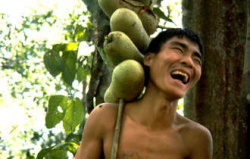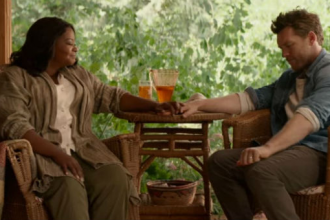"Avatar is real" say tribal people

Penang man collects forest fruit
As the acclaimed 3D film 'Avatar' was today nominated for an Oscar in the Best Film category, tribal peoples around the world have claimed the film tells the real story of their lives today.
Audiences for the popular film are transported to the future and to a lush moon in another solar system where humans have a mining base. Avatar is set almost entirely on Pandora, where a vital mineral which is the key to solving Earth's energy crisis can be found. The native people however are not keen on handing over a resource which lies beneath their most sacred site, and for which large-scale mining would mean the destruction of their rainforest habitat with all its beauty and biodiversity. Director James Cameron's hero infiltrates the native Na'vi people through being wired up neurally to a mindless body which resembles a Na'vi. But once he has lived among them for a while, he begins to value their way of life and worldview over that of his military-industrial complex paymasters.
A Penan man from Sarawak, in the Malaysian part of Borneo, told indigenous rights group Survival: "The Na'vi people in Avatar cry because their forest is destroyed, but it's the same with the Penan. Logging companies are chopping down our big trees and polluting our rivers, and the animals we hunt are dying."
Kalahari Bushman Jumanda Gakelebone said: "We the Bushmen are the first inhabitants in southern Africa. We are being denied rights to our land and appeal to the world to help us. Avatar makes me happy as it shows the world about what it is to be a Bushman, and what our land is to us. Land and Bushmen are the same."
Brazilian Davi Kopenawa Yanomami, adds: "My Yanomami people have always lived in peace with the rainforest. Our ancestors taught us to understand our land and animals. We have used this knowledge carefully, for our existence depends on it. When my "main" Yanomami land was invaded by miners, a fifth of our people died from diseases we had never known." Avatar Director Cameron suggests that, "Avatar asks us to see that everything is connected - all human beings to each other, and us to the earth".
In November 2009, the Jesuit Superior in Amazonia, Fr Roberto Jaramillo Bernal, issued a statement saying that, "the Garden of Eden is being systematically destroyed". He pointed out that indigenous people - with their cultures and their dreams - have occupied the Amazon rainforest for more than 10,000 years. He said the Jesuits would support them in their fight against "national and international covetousness and greed" for "at the core of their ways of living are the virtues of austerity and temperance, the measured use of resources, virtues which the modern world dismisses and undervalues". He felt Amazonian people have the right to live in freedom and peace.
Church opposition in the Philippines to destructive mining on its islands has long been supported by Church groups in Britain including Columban Faith and Justice and the Ecumenical Council for Corporate Responsibility. At the 9 February 2009 launch of a report at Westminster titled, Philippines: Mining or Food?, Victoria Tauli-Corpuz, an indigenous woman from the Northern Philippines commented that, "mining is not the path to our development". The report called for the country's Mining Act of 1995, which opened the country up to foreign mining companies, to be revoked.
"The Church joins in the collective and continuous call against the uncontrollable plunder of our natural resources," said the Philippine bishops in 2008. "Above all" they added, "it calls for a moratorium on mining activities until the government and the mining companies learn to uphold the rights of the indigenous peoples, compensate the affected communities for past damages, and ensure responsible mining practices". Companies with a British base whose plans for mining in the Philippines were challenged included Xstrata Copper, BHP Billiton, and Crew Minerals.
For more information see: www.survivalinternational.org/tribes/penan
www.avatarmovie.com/

















